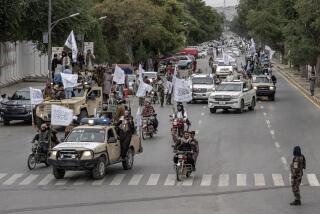Stabilize All of Afghanistan
- Share via
The ambush by suspected Al Qaeda and Taliban forces that killed Green Beret Sgt. Gene Arden Vance Jr. this week was a reminder that the fighting in Afghanistan, while not as intense as in the war’s early days, is far from over. The Bush administration gets this. What it seems not to get is the need for peacekeepers outside Kabul; only hunting down terrorists won’t keep this Central Asian nation from slipping back into the chaos that allowed Al Qaeda to thrive.
Vance’s death came a month after U.S. bombs accidentally killed four Canadian soldiers. Continued assaults on patrols and mortar attacks on bases of allied troops also demonstrate that a British general was wrong to declare the campaign to drive out the terrorists “all but won.”
No one in the Bush administration or U.S. military ever predicted that battling in the mountains of Afghanistan would be quick or easy. Now U.S. officials need to recognize the need for stability.
The House of Representatives voted this week to give $1.3billion in aid, including $300million to develop and arm the Afghan military. Several members demanded that the Bush administration spell out its strategy for providing security for Afghanistan, especially when warlords continue to clash and common criminals prey on travelers in areas outside Kabul.
The U.N. Security Council wasn’t helpful when it followed Washington’s wish that the peacekeeping force not be expanded. The success of the international brigade in bringing security to Kabul argues for its expansion to cities like Mazar-i-Sharif, Herat and Jalalabad. The U.N. troops in Kabul have not interfered with U.S. operations in the capital; there is no reason to believe they would get in the way in other cities, despite Bush administration concern.
Security will be especially important when the Afghan loya jirga, or grand council, opens its weeklong meeting June 10. The 1,500 members will pick a transitional government to rule until elections in two years, an important step on the road to becoming a functioning nation again.
Afghanistan’s centuries-long tradition of ethnic battles continues today. Jousting for positions in the new government can turn violent.
Making Afghans living outside Kabul and foreign aid workers in the countryside feel safe also would help in opening schools, planting crops and carrying out the other tasks of rebuilding a nation shattered by more than two decades of war.
There have been successes, especially in getting girls into classrooms after they were barred by the Taliban, but the process of reconstruction has just begun.
More to Read
Sign up for Essential California
The most important California stories and recommendations in your inbox every morning.
You may occasionally receive promotional content from the Los Angeles Times.













